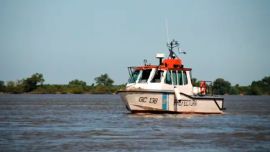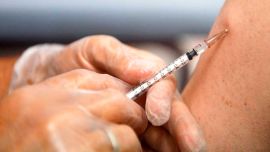THE WEEK IN CORONAVIRUS
At press time yesterday there was a total of 282.437 confirmed cases of coronavirus and 5,527 deaths, as compared to 228,195 cases and 4,411 deaths the previous Friday. On Monday classrooms were filled for the first time in Argentina since March in the least populated 14 of San Juan’s 19 departments (even if the 10,000 children returning to school and observing social distancing in their face-masks were only a fraction of the province’s school-age population, some 230,000) – on Wednesday it was the turn of Formosa where almost 10,000 children resumed classes in 407 rural schools. Tuesday was a black day for the pandemic as the Covid-19 death toll topped 5,000 with a record 240 deaths posted for that day (even if only 17 actually died then with the other reports delayed from previous days, mostly the weekend – these lags increasingly fell under critical scrutiny last week) while the confirmed cases included both the daughter and ex-wife of Senator Carlos Menem (although not the ex-president himself). But the next day President Alberto Fernández announced with pride that an experimental vaccine against coronavirus (the result of research by a University of Oxford laboratory) would be produced here and available in the first half of next year with the manufacture of up to 200 million doses, of which 22.4 million would be reserved for key workers and risk groups in Argentina. Fernández was thus only a day behind Russia’s Vladimir Putin (a subject of irony worldwide) in announcing a vaccine. The same day City Mayor Horacio Rodríguez Larreta and Buenos Aires Province Governor Axel Kicillof huddled for almost three hours to harmonise the next phase of quarantine while the advance of coronavirus in many inland provinces (with the AMBA Buenos Aires metropolitan area’s share of contagion down from a peak of 95 percent to 80 percent) prompted anticipation of more lockdown nationwide, which the president duly delivered at around 2pm on Friday.
TAX MORATORIUM
The Senate passed the government’s controversial tax moratorium by a 41-28 vote in the small hours of yesterday. While the Juntos por el Cambio opposition accepted the need for a moratorium in principle to ease the acute problems faced by businesses as a result of pandemic lockdown, they objected to its inclusion of “an amnesty for a business group” in the words of Senator Esteban Bullrich (referring to Grupo Indalo headed by Kirchnerite tycoon Cristóbal López, charged with fuel tax evasion to the tune of several billion pesos).
JULY INFLATION 1.9%
Last month’s inflation was 1.9 percent, INDEC statistics bureau reported on Thursday, below two percent when most market estimates had forecast it to be well above. Inflation thus totals 15.8 percent for the year so far and 42.4 percent for the last 12 months. Core inflation was much closer to the market forecasts at 2.5 percent even if its central component of food and beverages rose at only half that level (1.3 percent). Domestic appliances (3.9 percent) along with recreation and garments (both 3.3 percent) were the main culprits while frozen public service billing and a slowly climbing official exchange rate were seen as restraining factors, apart from the prime factor of the plunge in economic activity.
YPF POSTS LOSSES
YPF posted losses of 85 billion pesos (US$ 1.105 billion) for the second quarter, the state oil company reported last Monday, amply exceeding the negative result of 33.36 billion pesos registered for 2019 while the first quarter of this year (almost untouched by the pandemic) recorded a profit of 6.35 billion pesos. Oil sales contracted 85 percent in the immediate wake of the quarantine beginning on March 20 and later in the quarter stabilised around the level of a 45 percent fall, informed YPF. As a result, company income of 134 billion pesos was 17 percent lower than the second quarter of 2019 even in nominal terms. Fuel prices have remained frozen since late 2019 with world oil prices at record lows. "The company was undergoing a complex situation from the economic and financial standpoint which was then compounded by the effects generated by the Covid-19 pandemic," YPF’s communiqué pointed out. In the wake of these losses YPF announced that it was "comprehensively reviewing its cost structures. "
MARKETS & THE DOLLAR
Nothing changed much on exchange markets last week in the interim period between the August 6 debt settlement with the main bondholder groups and its formalisation with the Securities & Exchange Commission in the United States due on August 24. The parallel “blue” dollar inched down yesterday from 133 to 132 pesos since the previous Friday while the Banco Nación quotation rose from 75.75 to 77.25 pesos in the same period. Country risk failed to sustain the euphoria following the settlement, rising from 2,056 to 2,113 points since the previous Friday.
JUDICIAL REFORM
The government’s judicial reform (criticised from various quarters last week) has yet to enter Congress but on Thursday the Senate began to review the transfer to the federal courthouse of two judges trying Vice-President Cristina Fernández de Kirchner among others for corruption, defying a ruling by administrative litigation magistrate María Alejandra Biotti to suspend the procedure.
VICENTIN CEO DIES FROM HEART ATTACK
Vicentin CEO Sergio Nardelli, 59, died suddenly of a heart attack on Wednesday evening at his home in Reconquista, Santa Fe. Although his death came without warning, Nardelli had been under enormous pressure for several months, hounded by creditors chasing debts to the tune of over US$1.3 billion since late 2019, facing several lawsuits for asset-stripping among other charges and fighting off a government trusteeship as a prelude to nationalisation (now on hold) since June.
JUDGE URSO DIES
Ex-judge Jorge Urso, 63, died on Wednesday after falling from his horse. Although included on the list of the so-called “serviette judges” considered subservient to the 1989-99 Carlos Menem presidency (alongside Claudio Bonadio and Rodolfo Canicoba Corral, who respectively died and retired this year), Urso’s biggest moment of fame came when he placed Menem on trial for gunrunning in 2001. Urso was also the judge who sentenced picket leader Luis D’Elía for invading a Boca police station, a conviction upheld by the Supreme Court earlier this month.




















Comments